SUMMARY
This is AI generated summarization, which may have errors. For context, always refer to the full article.
![[Only IN Hollywood] Truly an honor just to be Asian](https://www.rappler.com/tachyon/2023/05/gold-house-collage.jpg)
LOS ANGELES, USA – Two recent events bolstered Sandra Oh’s now-famous quote: “It’s an honor just to be Asian.”
Gold House’s Gold Gala 2023 and the “From Asian Excellence to Creative Excellence” panel at Milken Institute’s 2023 Global Conference left me in awe and even prouder of my Asian heritage.
The more recent one is the second gala of Gold House, the leading non-profit collective of Asian founders, creative talents, and leaders committed to unifying and elevating Asians and Pacific Islanders to achieve more representation and equity.
Gold House made history last May 6 by bringing together the biggest assembly so far of Asian talents, movers, and shakers from various fields in one night and place – The Music Center in downtown Los Angeles.
Everywhere I turned, from the gold carpet, to the welcome reception in the lobby of the hallowed Dorothy Chandler Pavilion, to the dinner under the stars at the plaza, to the walk back to the Pavilion for the afterparty, I saw beaming faces of icons, stars, and rising talents.
The emotionally moving, often uplifting speeches of the presenters and awardees in the show held during dinner made me stand up and cheer often.
The jubilation was over the A1, A100, and special honorees.
Lea Salonga, who was among the A1s and special awardees, was cited as a legend.
In an evening of vigorous applause and appreciative screams, the trailblazing Tony Award winner elicited one of the longest and most exuberant ovations from the audience of over 700. And most of these guests are accomplished names in their own right, mind you.
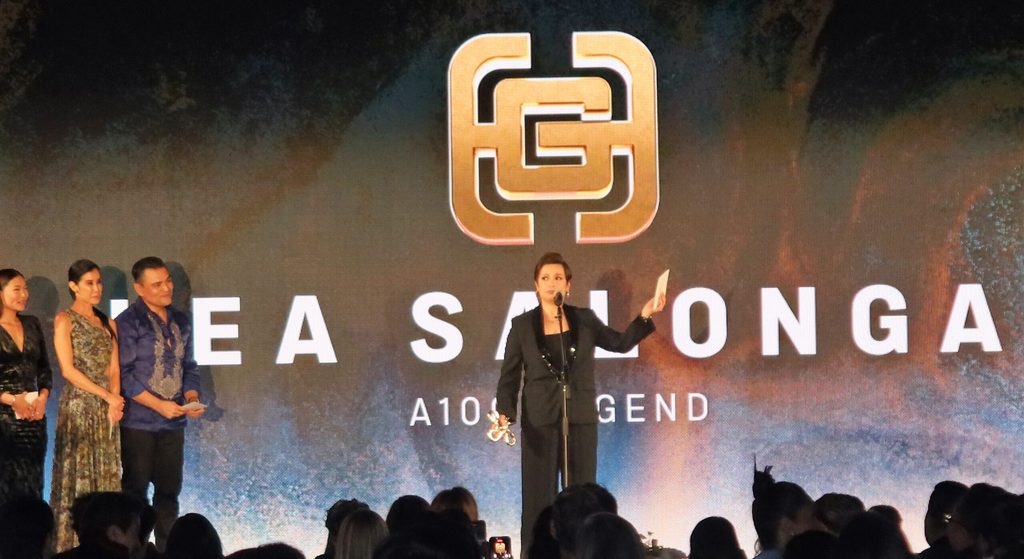
In her extemporaneous acceptance speech, Lea eloquently talked about how she has been “in the industry” for 45 years (she proudly declared she’s 52 now), how glad she was when she finally saw a character like Mulan, who is a cartoon but is an Asian like her, and who has no man beside her, and how Everything Everywhere All at Once made her scream and cry in her apartment.
The Olivier Award winner praised the “mind-blowingly incredible” Gold House for uniting and championing Asian Pacific creators. But she also echoed what everyone in the community agrees on – there’s so much more that needs to be done.
Lea also brought up the racism and violence against Asian Americans which is a pervasive concern.
On a side note, the black tux-clad performer admitted losing her composure when she met K-pop star Eric Nam.
The singer-actress’ fellow A1 and special honorees included the casts and creators of EEAAO and the 1993 pioneering film on Asian women, The Joy Luck Club, Ke Huy Quan, Sandra Oh, and Filipino American trans rights activist Geena Rocero.
In accepting the SeeHer award, Sandra – whose “It’s an honor just to be Asian” kept resonating that evening – said, “I’ve actually spent my whole career trying to accomplish the name of this honor, not only for myself but for others. I used to think seeing myself meant seeing myself or ourselves onscreen, but it’s actually much more than that.”
“I think the search for what it is to be seen is a deeply personal journey and cannot be satisfied or found by simply seeing ourselves onscreen. I think true change and transformation must be initiated from that person or place because truly being seen is not limited to our eyes.”
For his part, 2023 Oscar and Golden Globe winner Ke Huy Quan quipped, “When I think of a leading man, I think of someone who is six feet tall with big muscles, good-looking, and a ladies’ man. That practically screams me, right?”
“When you imagine a winner, I don’t fit the mold. I finally realized that winners don’t always have to look the same. You can also win too, if you just believe in yourself.”
Geena stressed, “I want to harness what it means to be so proud as an AAPI person, particularly as a proud trans Filipina. I want to live boldly, create things unexpected of us, and never, ever again apologize for being who we are.”
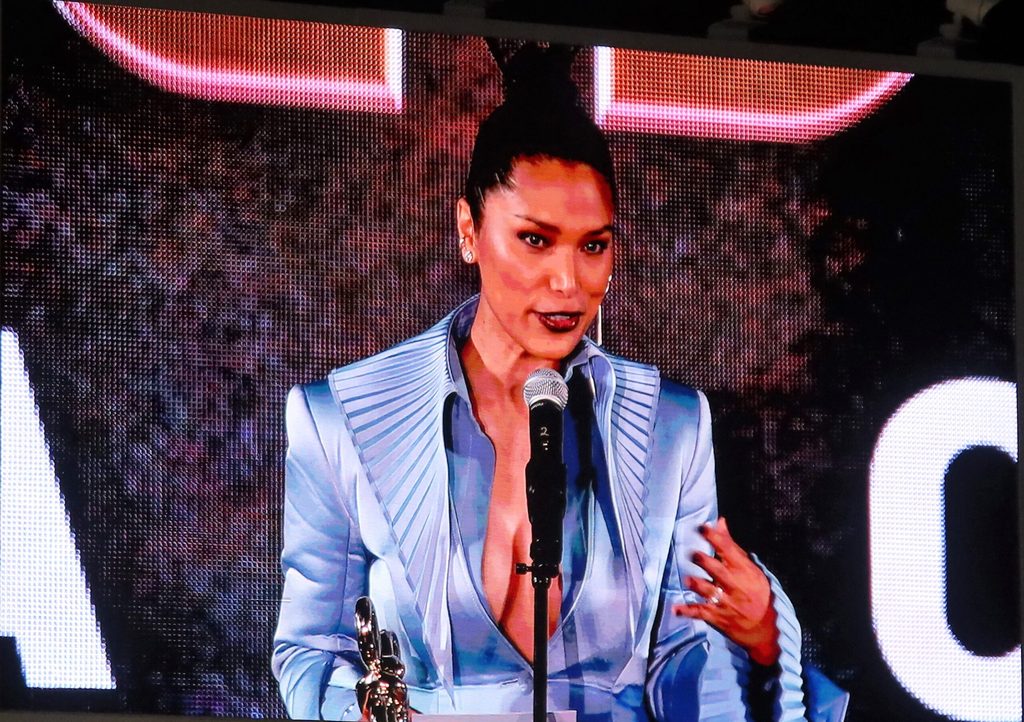
When the casts of Joy Ride and The Joy Luck Club appeared together onstage, it was, well, a joyful and beautiful moment.
Joy Ride’s Ashley Park, Sherry Cola, Stephanie Hsu, and Sabrina Wu presented The Joy Luck Club’s Janet Yang (the producer who is a Gold House cofounder and the Academy of Motion Picture Arts and Sciences president), Ming-Na Wen, Tamlyn Tomita, Rosalind Chao, Lauren Tom, Lisa Lu, and Kieu Chin with the inaugural Gold Generation award in honor of the film’s 30th anniversary.

It was inspiring to see both casts coming together onstage to toast The Joy Luck Club, regarded as “a cultural touchstone” for the Asian and Pacific community. A standing ovation highlighted this moment.
Eva Longoria, Gold Ally awardee for bridging the gap between the Latino and AAPI communities, quipped, “The thing we probably have most in common is that most of us have parents who don’t understand what we actually do for a living.”
Every May, Gold House also celebrates 100 Asian Pacific leaders who made an impact on culture and society over the past year. The list is an impressive roll of luminaries from various endeavors – from media, fashion, in front of and behind the camera, the corporate world, sports, banking, and more.
I wish I have space to mention all, but these are among the A100 honorees this year: Pulitzer Prize-winning journalist Jose Antonio Vargas, Miss Universe R’Bonney Gabriel, actors Randall Park and Hong Chau, Rob Bonta (California’s first-ever Attorney General), and Beef’s Ali Wong, Steven Yeun, and creator Lee Sung Jin.
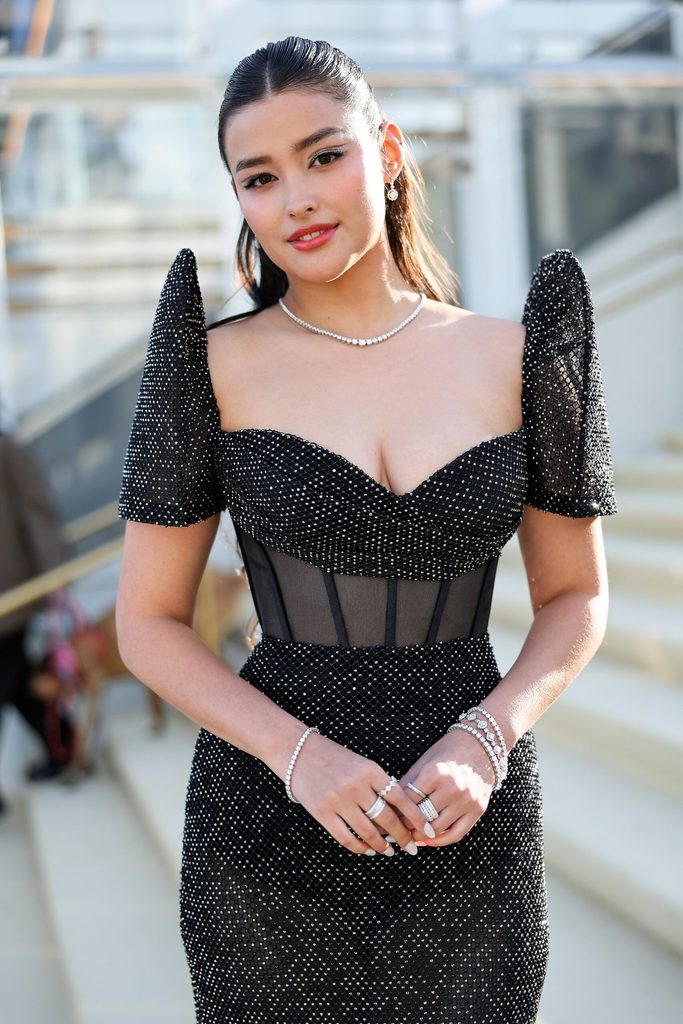
The Filipino contingent included Arielle Jacobs (who will play Imelda Marcos in Here Lies Love, coming on Broadway, with Lea as Mrs. Aurora Aquino, Ninoy’s mother), Bella Poarch, Liza Soberano, Reggie Lee, Jon Jon Briones, AJ Rafael, Giselle Tongi, Frederic Aspiras, Clint Ramos, Jeremiah Abraham, Timothy Granaderos, Jazz Tangcay, Dino-Ray Ramos, Janet Nepales, and Patrick Starr.
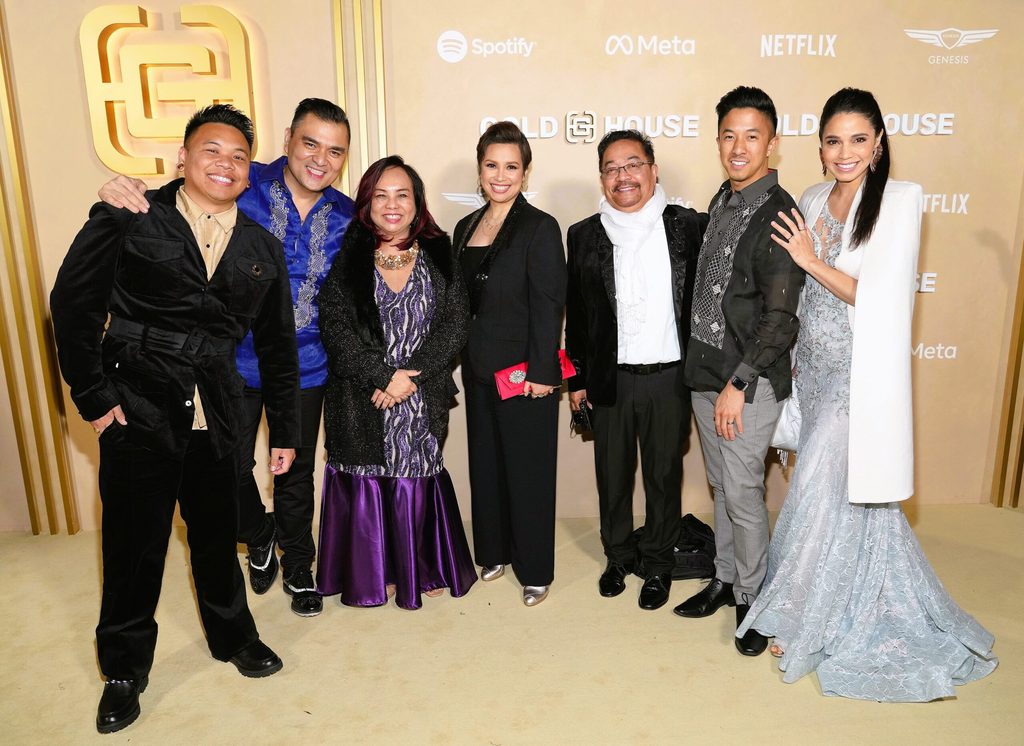
Many guests came up with their interpretations of the “multicultural black tie” dress code. Daniel Dae Kim stood out in full hanbok regalia.
With such a powerhouse audience, Bing Chen, Gold House CEO and executive chairman, managed to hold everyone’s attention with his lively, spirited hosting.
He announced the next phase in Gold House’s expansion: “Gold Bridge is defined by three elements; bridging industries from content to commerce, bridging communities by showing how we can give a damn and invest in other multicultural groups, and we’re going to bridge continents.”
What a night it was of Asian solidarity, camaraderie, catching up, and making new connections among Asian and Pacific figures! It’s hard to top that evening but with Bing and Jeremy Tran, chief operating officer and executive director, at the helm, I am sure Gold House Gala 2024 will be even more special as AAPI leadership and representation continue to rise.
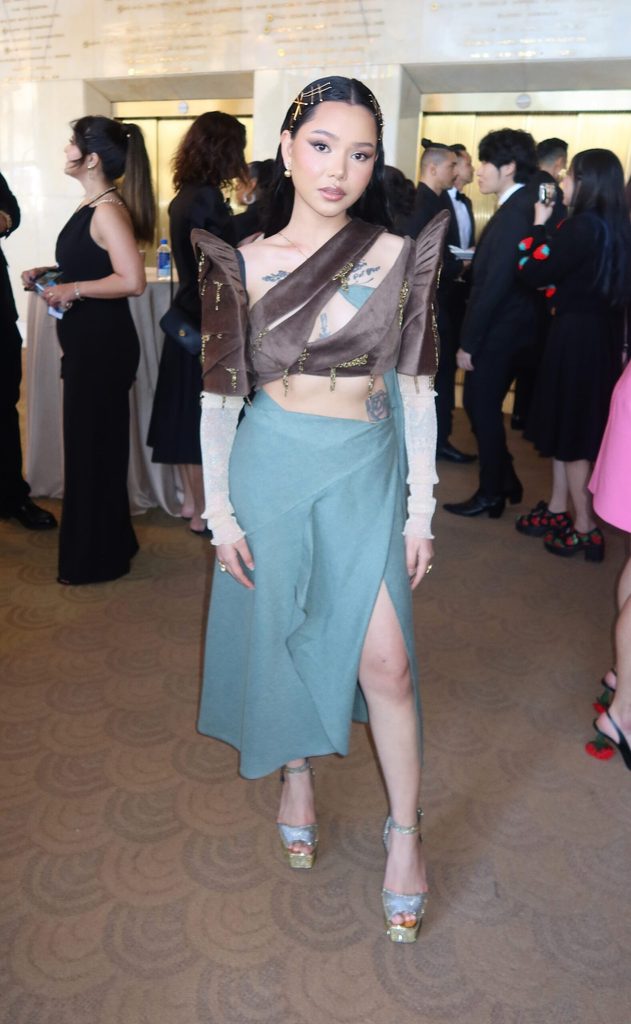
Asian excellence
A few days earlier, Daniel Dae Kim, Janet Yang, Padma Lakshmi, and Eric Nam joined Curtis S. Chin in a panel, “From Asian Excellence to Creative Excellence,” as part of the Milken Institute’s 2023 Global Conference at The Beverly Hilton in Beverly Hills.
The discussion, organized and moderated by Curtis, the chair of the Milken Institute, Asia Center, was illuminating and insightful. It was a perfect precursor to the Gold House Gala.
The panel is an inspiring, thought-provoking talk on Asian and Pacific representation. I highly recommend watching this video of the panel.
Curtis, who is the former US ambassador to the Asian Development Bank, began by saying, “The headline, ‘From Asian Excellence to Creative Excellence’ – what does that mean? All of us who went to a movie, turned on a TV, picked up a book, these days have really seen the flourishing of Asian American content.”
“And so, we have a mix of panelists from the world of film, television, books, and music. What we’re going to do today is talk a little bit about this moment in time. What do we celebrate? This beginning of Asian Pacific American Heritage Month. But let’s make sure it’s not just one day or one month that we celebrate.”
“So, we’re going to talk really about the content, the creativity that’s out there, and what do we need to do to make sure it’s not just a moment in time.”
I selected some interesting excerpts from each panelist.
Janet Yang on leading the Academy: “Well, what a year and how lucky am I to be in this position this year? In 1937, a woman named Luise Rainer won an Oscar for playing a Chinese farmer in the movie A Good Earth. She was obviously not Asian.”
“Not only that. Anna May Wong, who was a very established actress at the time, was not even considered for the role. And only one other Asian actress was nominated up until this year, which was Merle Oberon. She did not actually reveal her identity as being biracial.”
“So, 86 years after Luise Rainer won her Oscar, we finally have an Asian actress (Michelle Yeoh) playing an Asian woman in a movie (EEAAO) with an all-Asian cast. That is progress.”
“But there’s still work to be done, of course. We made progress, not just in representation onscreen but the movie had a lot of Asian light, had Mandarin and Cantonese in it. This is a symbol, for sure, a historic one.”
“But again, there’s so much work to be done because there are many other stories of those who have not had that kind of success, who in a more equitable world, would have.”
“And I guess this speaks to how important it is to celebrate talent as it’s emerging, not after it has won awards, not after it has made a hundred million dollars at the box office, but while it’s happening in real time.”
“And that is why I feel so gratified because our community has come together. There are many organizations now like Gold House, like others, which are doing the work at the ground level, and we’re not just waiting to jump on the bandwagon after there’s a worldwide phenomenon of an actress winning an Oscar.”
“So again, the early stages, the work that people do, none of us do this for fame or fortune, I can promise you. We are so used to rejection. We are so used to battling forces. We’re all Jedis in our work.”
“It’s never easy. And I would sum up by saying we need support from the financial community desperately because we work in darkness alone with no evidence of success in sight, often. And we just plow through, really relying on our instincts, our passions.”
“And sometimes we come out at the other end and there’s a little glory but that’s not why we’re doing it. So hopefully with this community, the message I would say to you is, please support us. Please support the artist.”
Daniel Dae Kim: “When we have films like Everything Everywhere All at Once and TV shows like Beef and even Crazy Rich Asians and The Joy Luck Club, which Janet produced, these are really important steps along the way, with people who are willing to do the work without an assurance of success.”
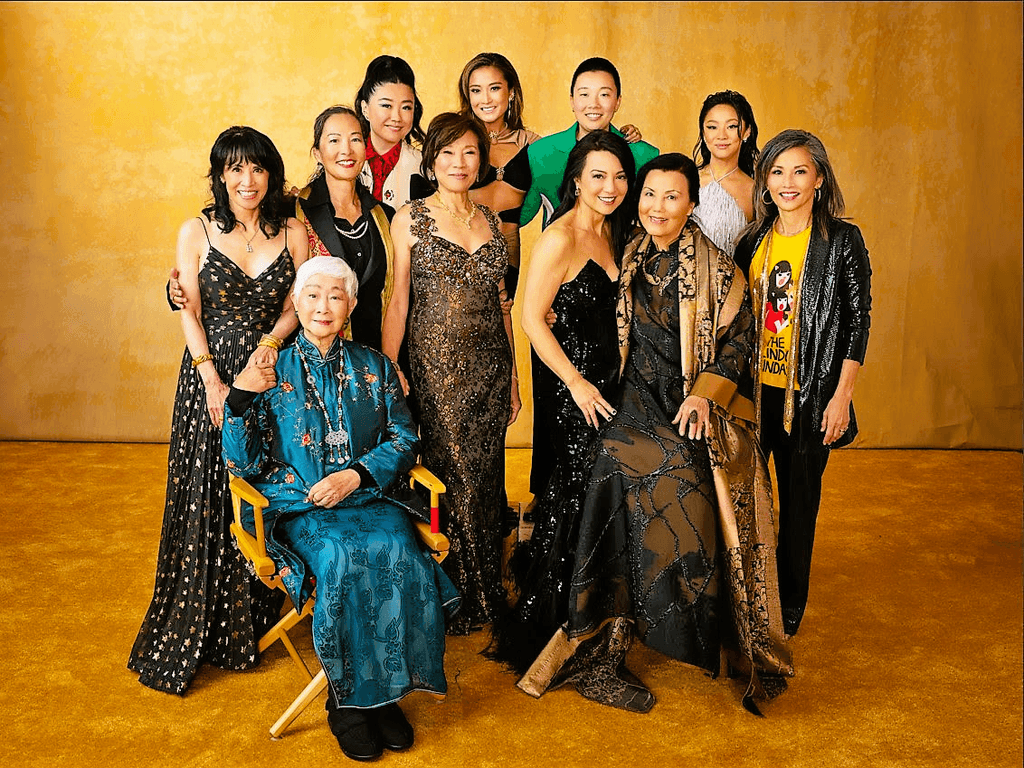
“For this audience here, it’s very much a start-up mentality. You have scrappy people who are very capable, who need to be capitalized. And some of you will make it and some of you will not but you have to believe in the cause, you have to be completely passionate.”
“So, what happens from here though, now that we have people like Janet, Padma, and Eric in such high-profile positions, is to create more of a situation where we can talk to others and encourage them to contribute in similar ways, to take the ball that we’ve moved down the field and bring it to the goal line.”
“If this is the beginning of a movement and not a moment, then there needs to be people to take up the mantle. So, for the people in this audience, you may not be in the entertainment industry but we all have spheres of influence, we all have wallets, we all have bank accounts where we can support content that you feel strongly about.”
“And it’s important that we speak up for the things that are important to us, especially as Asian Americans, because for so long in this country, we’ve been considered invisible. But we’ve always had an outsized spending power compared to our population. We just haven’t used it to support Asian American projects.”
“So that’s one thing to do but I would also say don’t do it out of charity. Encourage people to create good content. And if there are ways that you can be involved with that in some fashion, there are great stories out there right now.”
“I’m working on a project right now about Bill Hwang from Archegos (Capital Management), which many of you in this room will know. But there are great stories to be found in every sector and mining those stories and creating those stories for yourself is really important.”
Padma Lakshmi, the host of the long-running Top Chef and the series Taste the Nation, author, activist, and actress: “Taste the Nation is in its second season. I’m super proud of it.”
“It’s so rare, in our business, that you think of an idea in your head, as we were talking about, and you actually get to make it because film and television are so collaborative and there are so many reasons why it gets diluted into something else.”
“It’s been the privilege of my career to think of something in my head and actually have it come out exactly like I wanted it to and have people respond so positively. We got 100% on Rotten Tomatoes and it is born exactly out of this type of frustration of not seeing our stories.”
“And it came out of my advocacy on immigrant rights with the ACLU (American Civil Liberties Union). I wanted to tell stories and give my platform to people who don’t normally see themselves in mainstream media in an A-list way.”
“And so, it (Taste the Nation) is posing as a food show and there’s lots of yummy food on it but it’s really a cultural and a political show and it seeks to make us understand our fellow Americans better through food, humor and also some pathos.”

“And I hope you’ll all watch it. And talking about getting projects made, with all humility, I am one of the most well-known women in food around the world. Top Chef is in 174 territories and it took me so long to get Taste the Nation made.”
“Six or seven, I can’t remember the number but at least six networks turned me down. One network executive, who’s no longer working at that network, even wrote me an email that was like 600 words about why he turned it down.”
“But I’m so glad that I didn’t give up and I’m so glad that I wound up at Hulu, because as a filmmaker, I could not ask for a better partner in Hulu and Disney. And I’m so grateful to all of our participants.”
“Every season I have committed to going to an indigenous community. Every season I have committed to going to an Asian community, a black community, and we have a great lineup.”
“For so much of my life because of also my Indian upbringing and growing up in America, I was so worried about fitting in and worrying about what people thought. I tried to be whatever they wanted me to be in Hollywood just to get in the door for the audition.”
“And finally, I got to a point where I just said, ‘Fuck it.’ And I did. And there’s so much being written about me in the New York Post. The narrative of my life was just taken from me in such a way.”
“So, I wrote this memoir (Love, Loss, and What We Ate) about food, love, and loss and it was a real turning point for me because it was the start of me reclaiming my own narrative. And now there’s really nobody who can say anything that I haven’t said about myself.”
“And as a woman who comes from a very conservative culture, as a person of color working in Hollywood, it feels liberating to finally say, ‘Yeah, this is who I am and take it or leave it because I love it.’”
Eric Nam, asked by Curtis about going to Korea to pursue his pop career dreams and returning to the US: “To give everybody a little bit of context, I was born and raised in Atlanta, Georgia and I started my career as a musician in Korea.”
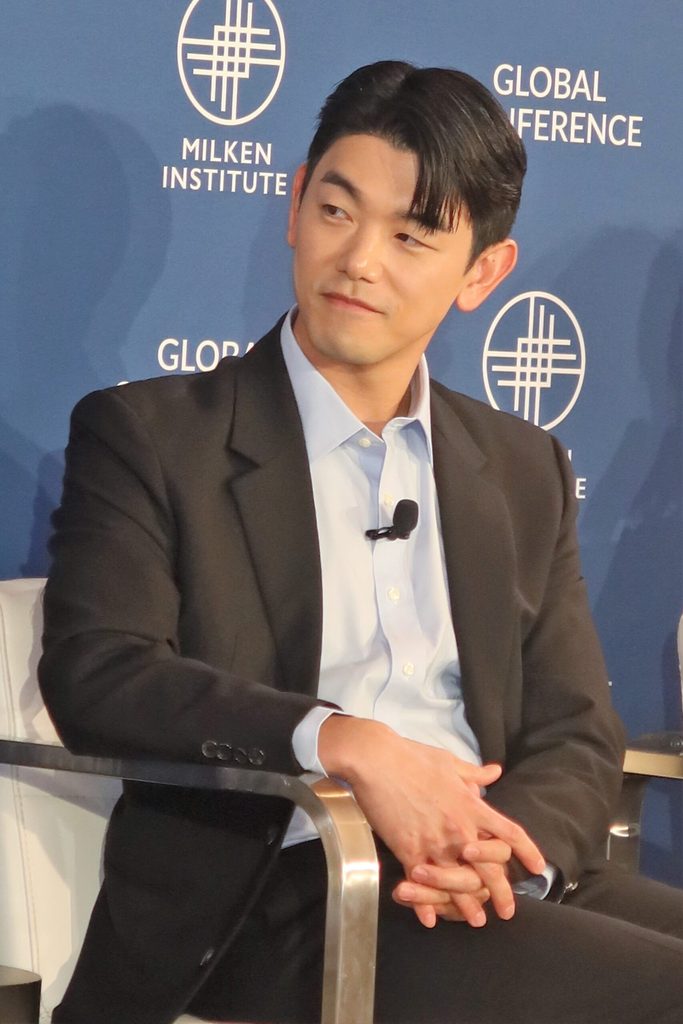
“And one of the most common questions that I got is, ‘Why did you go to Korea to start your career?’ Simply put, it’s because I didn’t think I had an opportunity to become a musician in the States. Even to this day, we all know BTS, we know Blackpink, and K-pop has become this major global phenomenon.”
“But if you ask yourself, ‘Is there an Asian American pop star that I can name off the top of my head right now?’ ”
Padma: “Eric Nam.”
Eric: “Thank you. Sometimes I’ll get that answer but oftentimes, a lot of people struggle to come up with more than one or two. And when we think about it, that’s also people who are just now starting to break.”
“It’s only been in the past few two, three, four years since we’ve been having this moment as Asian creatives, that we have these names, these younger Gen Z kids who are getting signed to major labels. But it’s again, a very new thing.”
“And so, when I started my career 10 years ago, I looked at the landscape, I look at record labels and what the traditional ways of becoming a musician were, and I never saw myself.”
“And so, I ended up doing the YouTube thing, putting up videos on YouTube, hoping to get discovered or found in some way. And that’s what happened. But it came through a TV show in Korea.”
“So, I’m very grateful to have been able to start my career in Korea and to build something from my parents’ homeland. But at the same time, I’m distinctly American, born and raised here.”
“So, trying to create a system and I guess an environment for people who look like us to really pursue every dream, whatever that dream may be from a young age, is what I hope we’re able to create beyond what we’re having right now and beyond just a moment.”
Daniel: “I can say that as many people as there are who are creating content now and who want to do music, food shows, and films, I share Padma’s sentiment, in that all of us up here, Janet included, have developed 50 to 100 projects.”
“I know my company alone has developed at least 50 over the last three or four years and they all at the center marginalized communities or communities of color.”
“But we’re still subject to someone to approve them, whether it’s a studio head or a financier for an independent project. We are not the end of the production line. We create but we’re still subject to approval.”
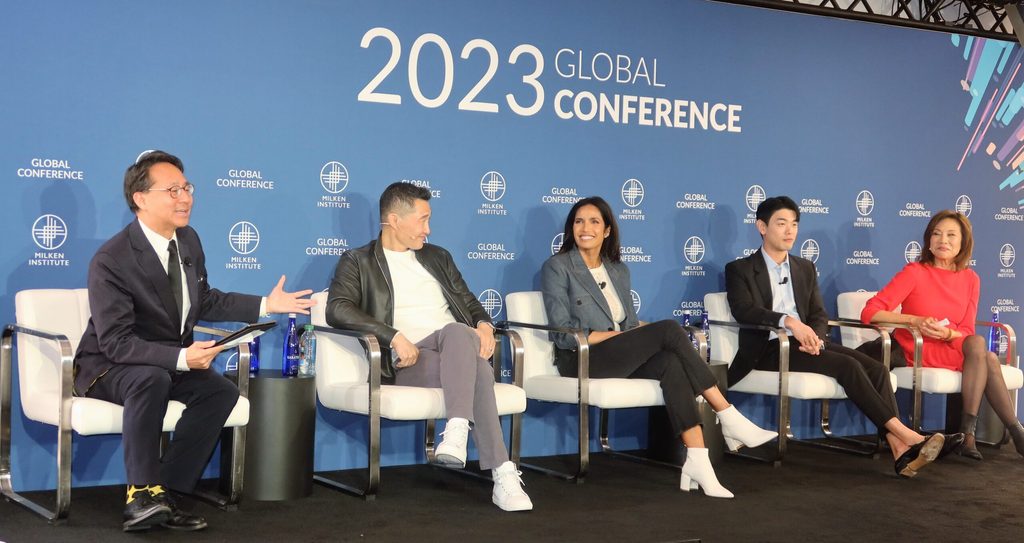
“So that’s one thing that is really important for us to remember as Asian Americans, it’s important to have representation at the upper levels as much as possible. So, it’s statistically borne out that Asian Americans tend to be overrepresented in the entry level positions of Fortune 500 companies but they suffer the highest attrition rate as they climb the corporate ladder.”
“So, when you look at the CEOs and CFOs of Fortune 500 companies, you see the exact opposite. You see an under-representation of Asian Americans. What is the reason for that? Why in these respective industries are we not climbing at the same rate that other demographics are?”
“One of the things that we can do is to support organizations like Gold House where Janet and I sit on the board and there’s a new organization called The Asian American Foundation (TAAF) that was just started recently. Both of these organizations share a common mission to encourage narrative change.”
“We as content creators have a responsibility for the content that we create. So, what are we putting out into the world? And organizations like Gold House, TAAF, and also CAPE, which supports professionals in the industry, really have a big part in shaping how we can do those things.”
“And to know that there are grassroots organizations that we can work with is super important because as Janet was saying, they support projects from the ground up, not after the bandwagon has already been built and is on the way.”
“So, if you guys can support organizations like CAPE, Gold House, and TAAF, that’s one way you can make a contribution, regardless of what your sphere is.”
“And the other thing is to keep advocating for yourselves, as people of color. This is one of the things about Asian Americans, even though it’s not historically borne out, one of the stereotypes is that we’re quiet, we’re silent and that we keep our heads down. That’s actually not true.”
Janet, asked by Curtis on how Gold House came about: “Gold House was born because of a person that you may have heard of, named Bing Chen, who worked at Google. He saw how there was this incredibly vibrant community of Asian Americans in Silicon Valley.”
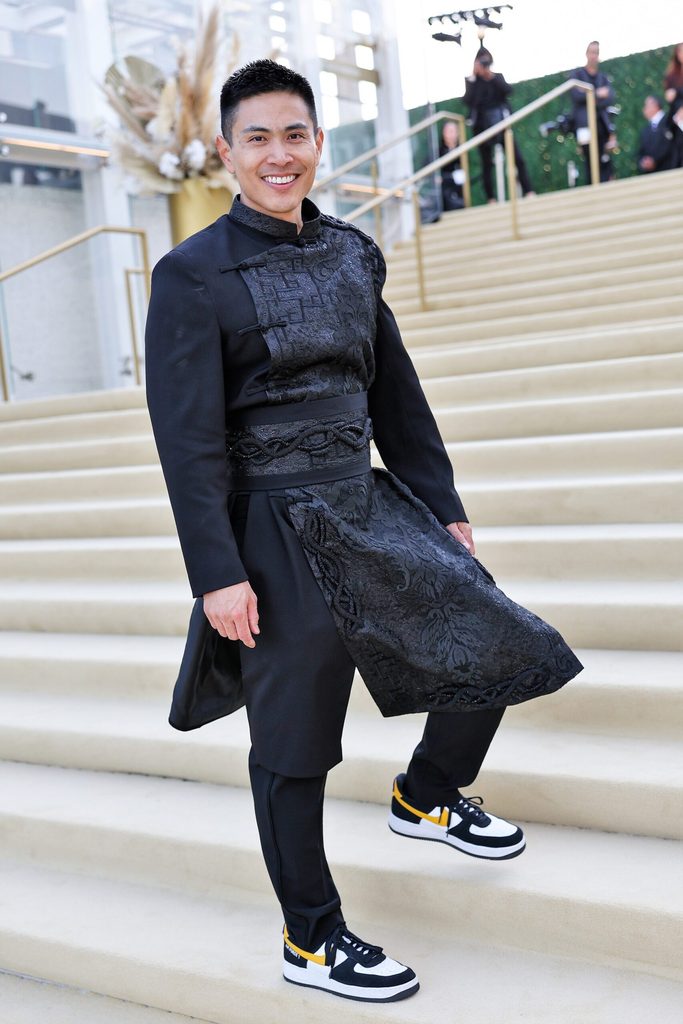
“He came to me and said, ‘Can you gather all the Asians in Hollywood? We should figure out what we can do together.’ We brought on people like Daniel.”
“And it turned out the people in Silicon Valley have the exact same interests as us, which is visibility and representation. They said, ‘We’ve bought and sold companies, built platforms. We have a lot of money in our pockets but we still don’t have shows and movies where our children can see themselves. And why is that?’”
“And we’re like, ‘We’ve been trying to make these shows and movies and we need funding.’ And so, we have done whatever we can to pull in resources from all different segments of society now, whether it be finance, fashion, and Silicon Valley start-ups, whatever he (Bing) sees, to promote projects.”
Daniel: “Can I just pick up on that really quickly? There were these tried-and-true unspoken rules in Hollywood that were always in place. One, no one is going to want to see an Asian face on their screen. No one is going to want to see an Asian face kiss someone on their screen.”
“If you remember a movie called Romeo Must Die, it was with Jet Li and Aaliyah. That movie was based on Romeo and Juliet and there’s no kissing. There are no signs of affection between Romeo and Juliet in that movie because there was the thought that no one’s going to want to see that.”
“Similarly, there’s this myth that black movies don’t travel well overseas and then came Black Panther. And now we have Crazy Rich Asians. So, the important thing to note about those things was they were not data-driven conclusions.”
“How can you have data when you’ve never had a sample? And so now we see data that prove all of these things wrong, which is why Netflix just invested $2.5 billion in Korean content. I don’t know of any entertainment company that’s more data-driven than Netflix.”
“So now we’re seeing the proof and now we’re seeing actual data-driven results that are changing the face of television and film.”
Padma: “I feel you about the kiss and the leading ladies. When I was living in Los Angeles and I was auditioning, I would see women who were about the same range professionally and everything else as me, get auditions.”
“And I would ask my agent, ‘How come I’m not going up for this role?’ And they would say, ‘Oh, they love you, Padma, but they’re not going ethnic with this role.’”
“And then I said, ‘Well, what about that person? She’s playing a best friend.’ They said, ‘You’re not going to be hired as anyone’s best friend.’ So, I was like, ‘Well, what…?’”

“And I would’ve loved to have been a leading lady. I want to see a leading lady. I want to see an Asian Lara Croft. I want to see all of those things. And I want to see us make mad, passionate love on the big screen. I do.”
Eric: “The challenges that we are hearing about in the film and TV world are the same in music. But I would almost argue that music, from an Asian American perspective, is a step even behind because it’s not as visual of a format. “
“When you’re able to see on TV and in screens, actors playing incredible roles, you can imagine yourself and dream yourself being in an occupation or whatever it is that you want to become.”
“Music is something that we listen to passively. And so oftentimes, it is kind of a second priority to TV and film. But having said that, that’s why it’s so important for musicians and people who want to create, even outside of film and TV, to have this advocacy, which Gold House is really working towards as well, which has been a great partnership with up and coming musicians.”
Padma: “To dovetail on what I was saying earlier, now that I’m well known in the non-fiction space, I’m getting all these acting roles. I’m the same person and the same actor I was when I was pounding the pavement.”
“I was probably better then because I wasn’t out of practice. And so, the way you do it exactly is to tell those stories, to go back to storytelling and say, ‘Yes, we are model citizens or model success stories but we’re also this…’”
“As Daniel was saying, we also have a lot of Asians living below the poverty line and those stories are also just as compelling and just as important to hear, see, and feel.” – Rappler.com
Add a comment
How does this make you feel?
There are no comments yet. Add your comment to start the conversation.